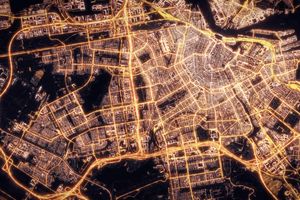What have we learnt from the COVID-19 pandemic?
As national lockdowns highlighted some of the problems with our modern lives, should we be hoping for the world to go back to ‘normal’ next year? Or should we be striving for something better?
The Covid-19 crisis has changed how our world looks in ways we never thought possible. We never would have dreamed of a circumstance wherein restriction was placed upon our travel, our working lives, or even our social lives. Nor could we have predicted that two national lockdowns would force us to stay at home.
So, a year ago, it would never have been comprehensible to imagine a break from the cycle of the usual busy, modern lives we’ve become accustomed to. We couldn’t have foreseen what that would have looked like. Especially when it placed into question how problematic some aspects of our usual, busy, modern lives are.
Unprecedented change in unprecedented times
Earlier this year, when many countries all over the globe came to a close for a spell of weeks or months, one thing became obvious: that without the usual activity of humankind, the world around us was changing.
One of the most notable effects brought upon by national lockdowns worldwide was the huge reduction in emissions. With fewer planes in the air and cars on the road, and a huge decrease in industry operating across the globe, carbon emissions made a significant drop at the start of the year.
Air quality improved exponentially in large cities. Some noticed the often rare sight of wildlife emerging in built up areas. Many people began opting to walk or cycle, as these mediums of travel were the most compliant with social distancing recommendations.
These changes, of course, are short lived. Many researchers think that the lasting impact of the reduction in emissions from Covid-19, in fact, will not be enough to make even a small difference in the bigger fight against climate change. The return to our normal lives also means a return to our usual habits: commuting, travelling, and industry across the world will reopen.
The problem with modernity
It’s very difficult to find any sort of positive in a crisis that has cost lives, jobs, and plunged the economy into disrepair. It would be inappropriate to frame any aspect of this pandemic as a good thing when you consider the sheer level of loss that we as a collective have experienced over the past year. But what has become apparent is that there are inherent problems with the modern way in which we are living. The luxuries, and even the normalities, of our era are placing tremendous strain upon our natural resources.
So, with that considered, should we be looking to return to the way that we were? Or is there another way that we can move forward? Are there small ways in which we can alter our way of life? And is there a greener, kinder normal we can look to, to secure a future for our planet? Perhaps there is a way to look at the pandemic, not as a positive, but as an opportunity for us to move forward with.
The new normal?
Since the virus first began to spread, and lockdowns were first implemented, we’ve heard the word ‘normal’ thrown around a lot. We have longed for the world to ‘go back to normal’, for our ‘normal lives’ to be resumed. We’ve heard phrases like ‘the new normal’, referring to a world without a vaccine, where social distancing and national restrictions are a part of life for the long term.
Now, a shaky glimpse of normality really is in view. The world as we knew it seems like a tangible possibility for the first time in a while. Many of us are starting to consider what that might mean, after all we have learnt from this pandemic.
For example, many have speculated that commuter travel may well remain low. Some predict that this working from home period has demonstrated how little need some businesses actually have for office space, with a potential long term rise in remote working. Others claim that many people will continue to pick cycling and walking as their preferred methods of travel.
Yet many businesses will be unable to operate remotely. There are hundreds of jobs that simply cannot be done from home. Transatlantic travel will remain a necessity for those in a wide range of sectors. And industry has been proved as absolutely vital to drive the economy – which will be essential as we recover from the devastating financial impact of Covid-19.
This means that change must be bigger. It requires more than just a shift in individual behaviour, or the actions of companies in a select few sectors.
What change might look like
What does a greener, better future look like? What can we hope to see in 2021 – and the years to come afterwards – that could help set us on a course for a more sustainable way of life?
Some ideas that people have thrown around so far include an emphasis on sourcing food locally, and being far less wasteful with food that we have already got. Making public transport more accessible, so that fewer cars are required to be on the road. Creating more public footpaths and cycle paths to allow people to travel and commute without always resorting to the use of vehicles. On a wider scale, it will be essential to see greener policies coming into play, and more funding dedicated to climate action and environmental resources.
As for us, well, we believe energy efficiency could be a pretty big game changer.
A problem for every industry
As businesses, we believe that we all have a responsibility to use our power for good. Energy powers everything that we do, no matter the sector. So, across every industry – from hospitality to education, or retail to construction – the chances are that energy is being needlessly wasted. Often without anybody even realising.
This is the year to change that. Businesses need to be committing budget to identifying these areas of wastage, and finding alternatives to combat waste and conserve energy.
All over the world, our partners are already pioneering the technology we have created to improve energy efficiency all over the world. We’re proud of their innovation, and know they’re going to keep doing incredible things in 2021.
Our promise to you
We don’t have all the answers. A better future depends on a whole lot of factors, from economic resources to the actions of world leaders, and while we’ve seen a lot of positive promises in recent months, we’ll need to hope for a real commitment to a green recovery plan from Covid-19 over the next year.
But that doesn’t mean that we can’t all do our bit.
Here at Best.Energy, a commitment to a greener future is at the heart of what we’re doing – that’s why we’re working in energy efficiency, because we believe in it.
So far, our greatest achievement has been the Eniscope – already, this has been installed for companies around the world, to identify their sources of wasted energy, and help them make proactive change. But we’re not stopping there.
Our promise to you this new year is that we’re going to keep working hard on solutions and technology that will make a difference.


